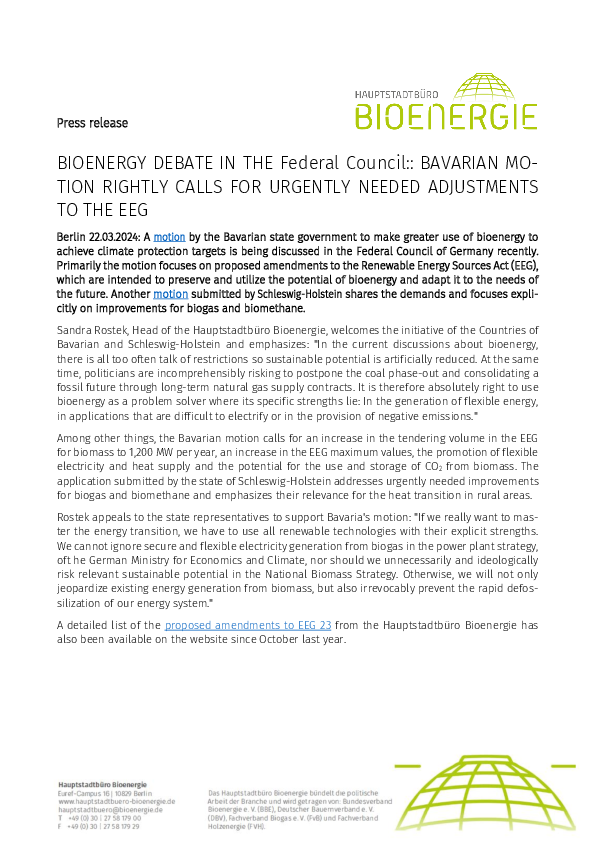Sandra Rostek, Head of the Hauptstadtbüro Bioenergie, welcomes the initiative of the Countries of Bavarian and Schleswig-Holstein and emphasizes: "In the current discussions about bioenergy, there is all too often talk of restrictions so sustainable potential is artificially reduced. At the same time, politicians are incomprehensibly risking to postpone the coal phase-out and consolidating a fossil future through long-term natural gas supply contracts. It is therefore absolutely right to use bioenergy as a problem solver where its specific strengths lie: In the generation of flexible energy, in applications that are difficult to electrify or in the provision of negative emissions."
Among other things, the Bavarian motion calls for an increase in the tendering volume in the EEG for biomass to 1,200 MW per year, an increase in the EEG maximum values, the promotion of flexible electricity and heat supply and the potential for the use and storage of CO2 from biomass. The application submitted by the state of Schleswig-Holstein addresses urgently needed improvements for biogas and biomethane and emphasizes their relevance for the heat transition in rural areas.
Rostek appeals to the state representatives to support Bavaria's motion: "If we really want to master the energy transition, we have to use all renewable technologies with their explicit strengths. We cannot ignore secure and flexible electricity generation from biogas in the power plant strategy, oft he German Ministry for Economics and Climate, nor should we unnecessarily and ideologically risk relevant sustainable potential in the National Biomass Strategy. Otherwise, we will not only jeopardize existing energy generation from biomass, but also irrevocably prevent the rapid defossilization of our energy system."
A detailed list of the proposed amendments to EEG 23 from the Hauptstadtbüro Bioenergie has also been available on the website since October last year.
About the bioenergy associations
Four associations pool their expertise and resources in the field of energy policy in the "Main Bureau Bioenergy": the German Bioenergy Association (BBE), the German Farmers' Association (DBV), the German Biogas Association (FvB) and the German Wood Energy Association (FVH). Together they represent the entire bioenergy sector, from farmers and foresters, plant and machinery manufacturers, energy suppliers to operators and planners. The Bioenergy Capital Office gives the many different players and various technologies in the bioenergy industry a strong common voice in the political arena. Particularly in the electricity and heat sectors, it advocates the energy policy interests of its supporting associations across all technologies. In its contacts with political decision-makers, the Capital City Bioenergy Office can draw on a broad network of supporters and cooperates in particular with the German Renewable Energy Federation (BEE)

